Batik sports bras and uniforms turned gym wear: Local apparel brands ride activewear boom
Sign up now: Get ST's newsletters delivered to your inbox
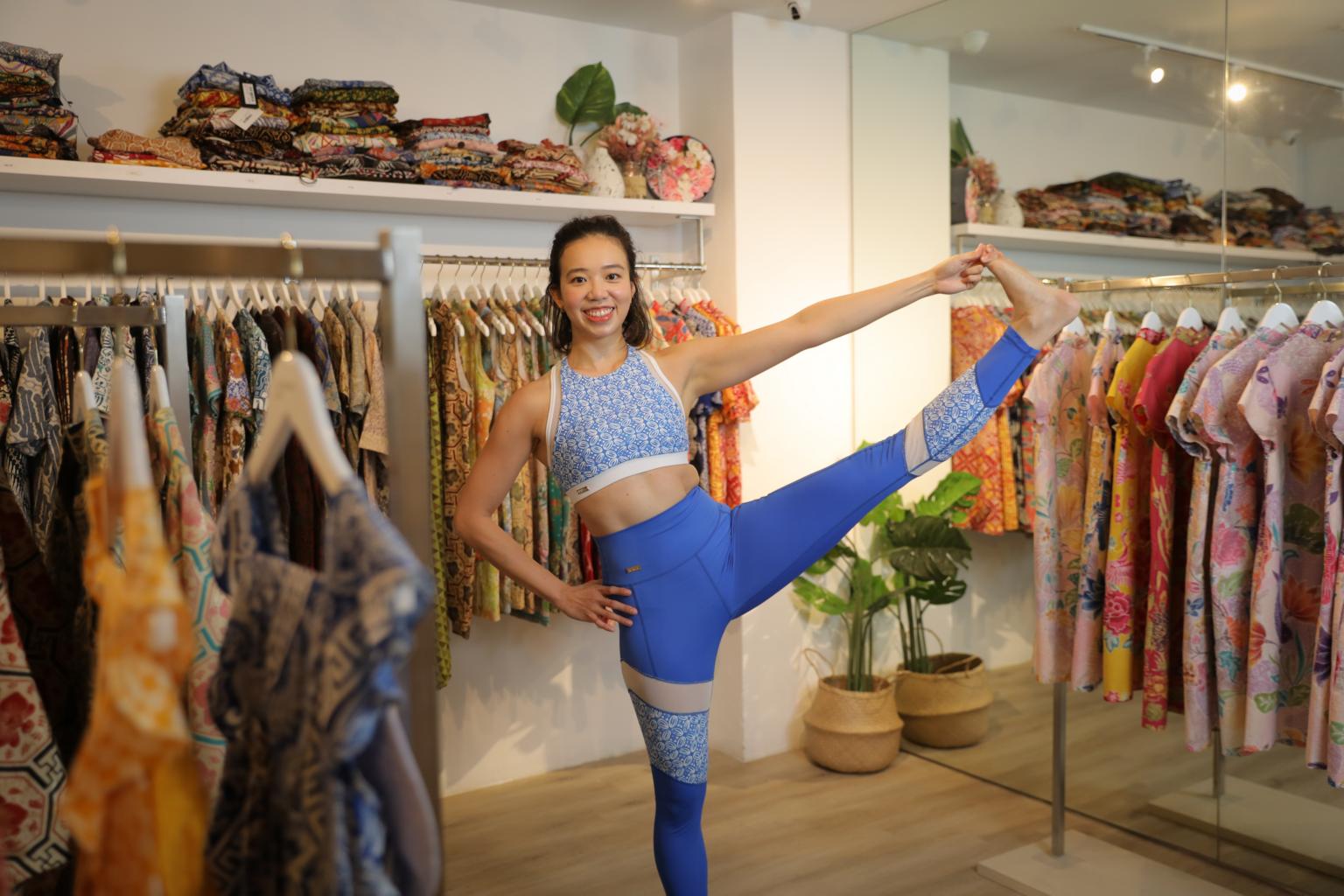
YeoMama Batik co-founder Desleen Yeo wearing Ninja activewear in the YeoMama store.
ST PHOTO: ONG WEE JIN
Follow topic:
SINGAPORE - Before the pandemic, Ms Merlyn Kang considered herself lucky if she could fit in two workouts a week.
Now with more time at home, the 26-year-old who works in a consulting firm finds herself attending HIIT (high interval intensity training) and aerial classes almost five times a week. And with the increased frequency, she has had to buy more workout gear too.
Since Covid-19 started, she has been shopping from brands such as Lululemon and Nike up to three times a month, picking up leggings, sports bras and tops.
"I bought more activewear during this time because I'm able to work out more regularly and plan a workout schedule while we're staying in more and working from home," she says.
"Most of my clothing purchases during Covid are activewear, compared with before, when it might have been workwear mostly."
The pandemic may have brought much of the fashion retail industry to its knees, but one sector has seen unparalleled growth: activewear.
With many turning to exercise - either to stave off boredom or stay in the pink of health - in a global crisis, the need for stylish workout wear has accelerated a boom in the sector, which had already been on the rise in recent years.
A study from the iPrice Group conducted between January and June found that Google search interest in South-east Asia for sportswear brands Nike and Adidas soared by 605 per cent and 577 per cent respectively, compared with before the pandemic. Nike, in particular, saw a 439 per cent increase in search interest for its apparel.
In Singapore, global sports brands reported similar demand.
Business for French sporting goods and apparel giant Decathlon has been "quite dynamic indeed", says Mr Nils Swolkien, managing director of Decathlon Singapore.
It saw a "modest year-to-date growth in revenue of 3.9 per cent as compared to 2019". Mr Swolkien also observed a "strong surge in sports like cycling and fitness - and a decline in more travel-oriented sports like hiking, surfing and underwater sports."
And while equipment sales are "exponentially higher than the sale of our apparel", Decathlon's house brand of activewear has been selling well, he adds.
"We have observed fitness and jogging apparel to be in our top-selling list, and our yoga and jogging apparel for women have also been exceptionally popular amongst Singaporeans."
Decathlon's current sportswear offerings encompass sports like yoga, fitness cardio, cross training, bodybuilding, running and racket sports, for men and women.
Since Covid-19 started, the brand has opened a duplex Experience store at The Centrepoint and a Click & Collect store in Tiong Bahru Plaza, with plans to open more stores in 2021.
Mr Swolkien adds: "Our aim to make sports accessible to all is valid more than ever in the Covid-19 time. We can say that the business is stronger for us now than it was previously."
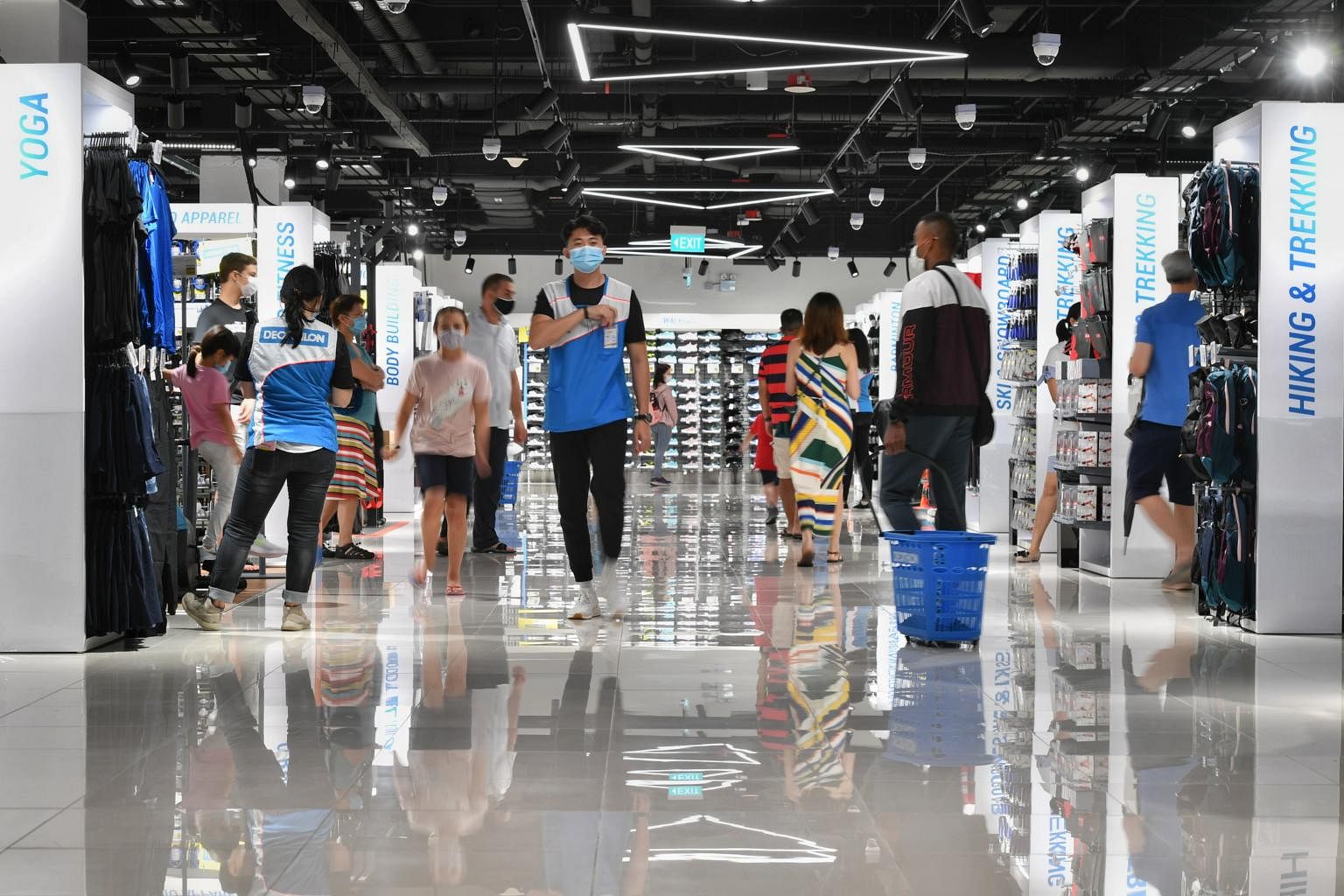
Physical retail at Under Armour suffered during the pandemic, but was saved by e-commerce, says the marketing director of Under Armour South-east Asia, Ms Yvonne Tey. The American sportswear and equipment company opened a new store in Parkway Parade last month, and opens its refreshed Orchard Central flagship store today (Oct 30).
More people are buying Under Armour sports apparel and shoes in this time, says Ms Tey.
"Sales via our e-commerce platforms increased as consumers' mindset and consumption patterns shifted during the pandemic, with more seeking digital-led, at-home and low-touch experiences.
"Overall, while it has been difficult, we have also seen growth."
Seizing the day
The booming interest in working out has not gone unnoticed by businesses here. Two home-grown apparel brands have decided to capitalise on the demand and launch gym wear lines.
For the first time in its 45-year history, B2B uniforms brand JML Uniforms has debuted a gym wear label selling direct to consumers.
Called F Brand (the F stands for fitness), the co-ed label launched online in early September with a range of activewear basics for men and women.
Bra tops and leggings are a far cry from the company's bread and butter of manufacturing corporate uniforms.
JML Uniforms began in 1975 as a fashion apparel line, supplying international department stores like Isetan and now-defunct chains Oriental Emporium and Yaohan. In the 1990s, the company switched to making uniforms, as their clients began importing labels from other countries .
Since then, the family business has been making corporate uniforms for companies in sectors ranging from F&B - such as the Paradise Group and Bee Cheng Hiang - to construction and government agencies.
Up until Covid-19, business was good as the turnover in these service industries is high, says director of JML Uniforms Jack Ou, 37. Gradually, new orders slowed, halting during the circuit breaker.
It was then that he decided to try B2C (business to consumer), after consulting with the SME Centre at Enterprise Singapore. JML had built up a network of apparel contacts over the years, so it was not a blind leap of faith, he says.
Gym wear was top of mind.
"During Covid, what else were you doing at home? You were either eating or doing yoga," says Mr Ou, who was inspired reading daily news of people crowding parks to exercise. "Even the government had to intervene to say 'stop going to parks'. But no matter (where you work out) you still need exercise wear."
Seeing one of his manufacturing partners in China switch to specialising in gym wear in 2015 gave him added confidence.
It took some convincing before his mother, Madam Ng Gim Kwee, 67, who started JML Uniforms with Mr Ou's fifth uncle, relented.
"To her it wasn't feasible because we were too used to doing B2B business. We manufacture what people order; not manufacture to wait for orders," Mr Ou says.
In April, he plunged head first into research with his supplier, and asked the women in his life what they wanted in their activewear.
He came to a few conclusions: that ladies' activewear is a "bigger market, as they need at least three items to exercise - a sports bra, top and bottom"; they like variety, and need a feeling of "safety" in the gear they don.
"Women want to feel good, in the correct set of gym wear, when walking into a gym. The worst thing that can happen is that when they are stretching, the pants give way."
F Brand's women's range is priced from $23.80 for a singlet to $103.80 for quick-dry pants, while the men's line goes from $28.80 for tees to $58.80 for runner pants. Since launch, they have received just under 100 orders.
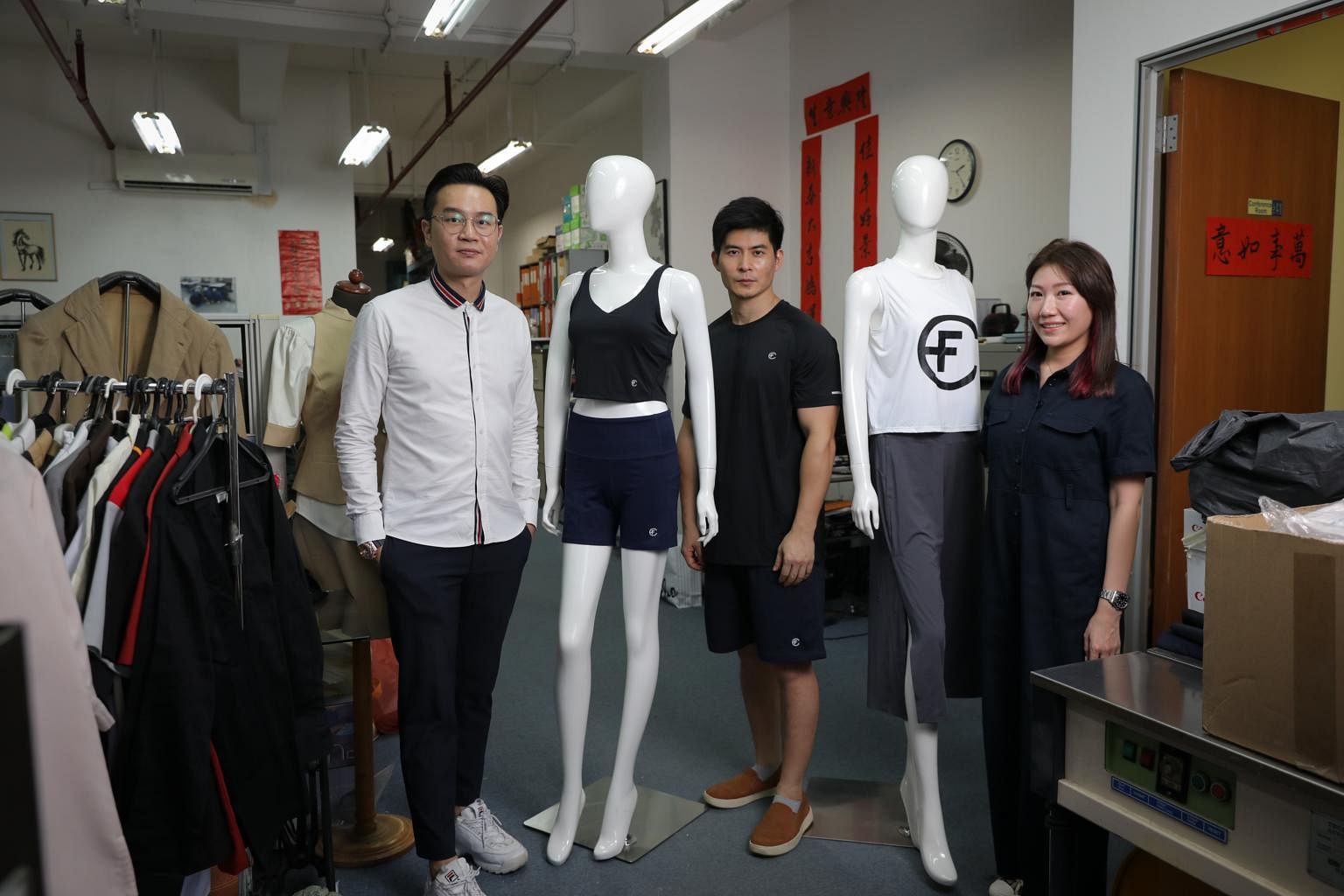
Branding has been his biggest challenge so far, says Mr Ou.
With no plans for a physical store, it has been hard getting word out, as customers cannot feel the products in person. Many Singaporeans also still prefer global brands such as Adidas, Nike and Lululemon, which boast variety and prestige, he adds.
"Branding creates confidence in the person wearing it."
Similarly, fellow local apparel brand YeoMama Batik had its fair share of obstacles trying to brand and debut its activewear line.
The batik fashion label, founded by Ms Desleen Yeo and her mother in January 2018, launched a batik activewear line called Ninja in September last year. But it was a failed debut, admits Ms Yeo, 29.
"We didn't realise how different activewear was from regular clothing - we'd assumed YeoMama Batik followers would also support Ninja, but it turned out to be a small percentage," she says.
They also struggled trying to target both the pole dancing community - Ms Yeo is an avid pole dancer - and the general fitness crowd. "It was a difficult journey trying to find which category we fit into best."
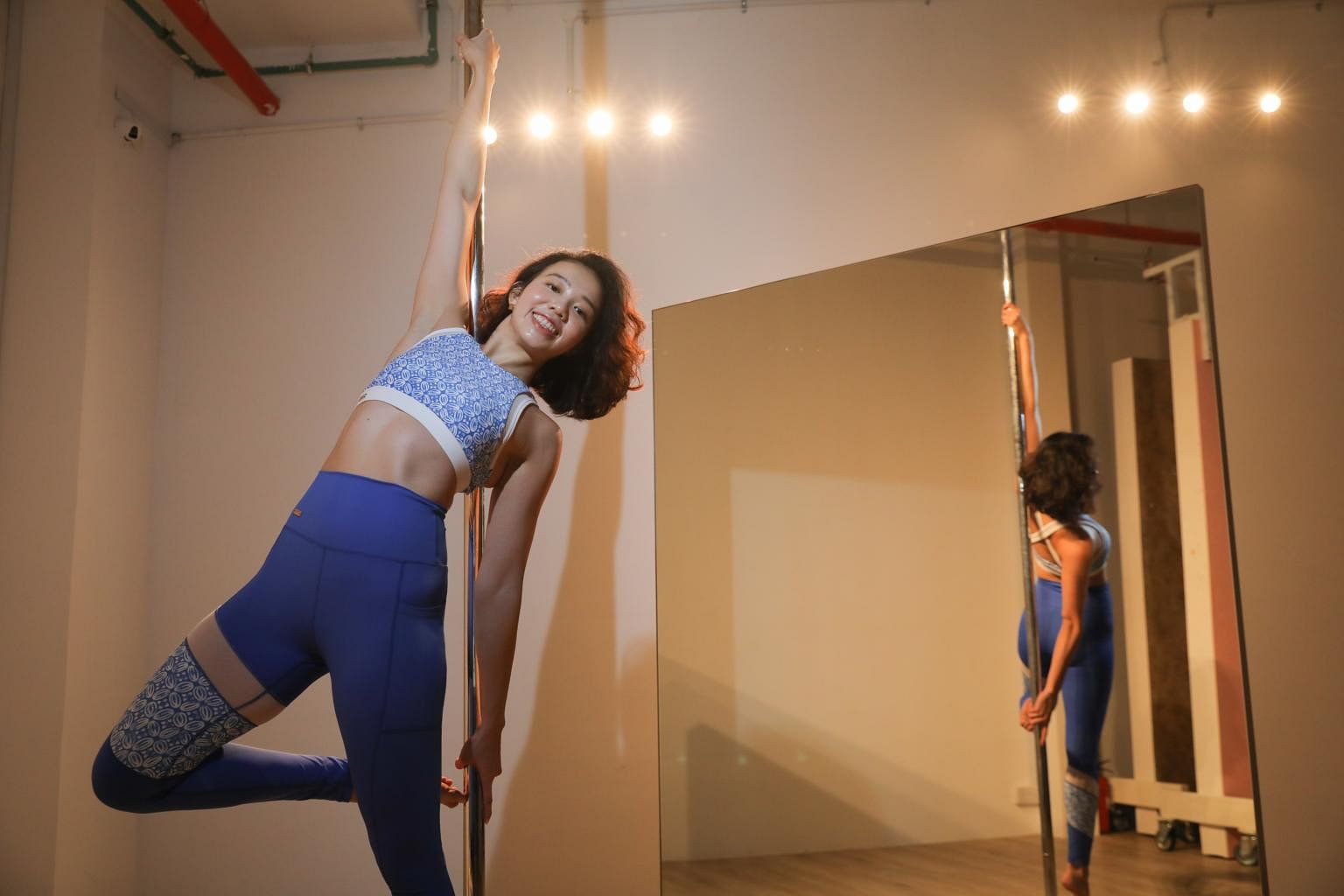
Covid-19 gave them the opportunity to rebrand and relaunch.
"Everyone was doing home workouts - even friends who don't usually work out were buying activewear," she says. "We saw it was a good chance to ride the wave and just whack."
Refocusing on the fitness community, the team redid the product photography and partnered with local yoga studios to promote the apparel.
This time, they made sure to photograph more "sporty" scenes with actual fitness trainers as models.
"I realised marketing is so important," says Ms Yeo. "People want to be inspired, and the activewear brand they shop from needs to relate to them emotionally, where they aspire to look like (the models in the product pictures).
"For fitness, it's a lot about being inspirational in terms of your workout or body transformation - you need constant workout content because people will look up to you."
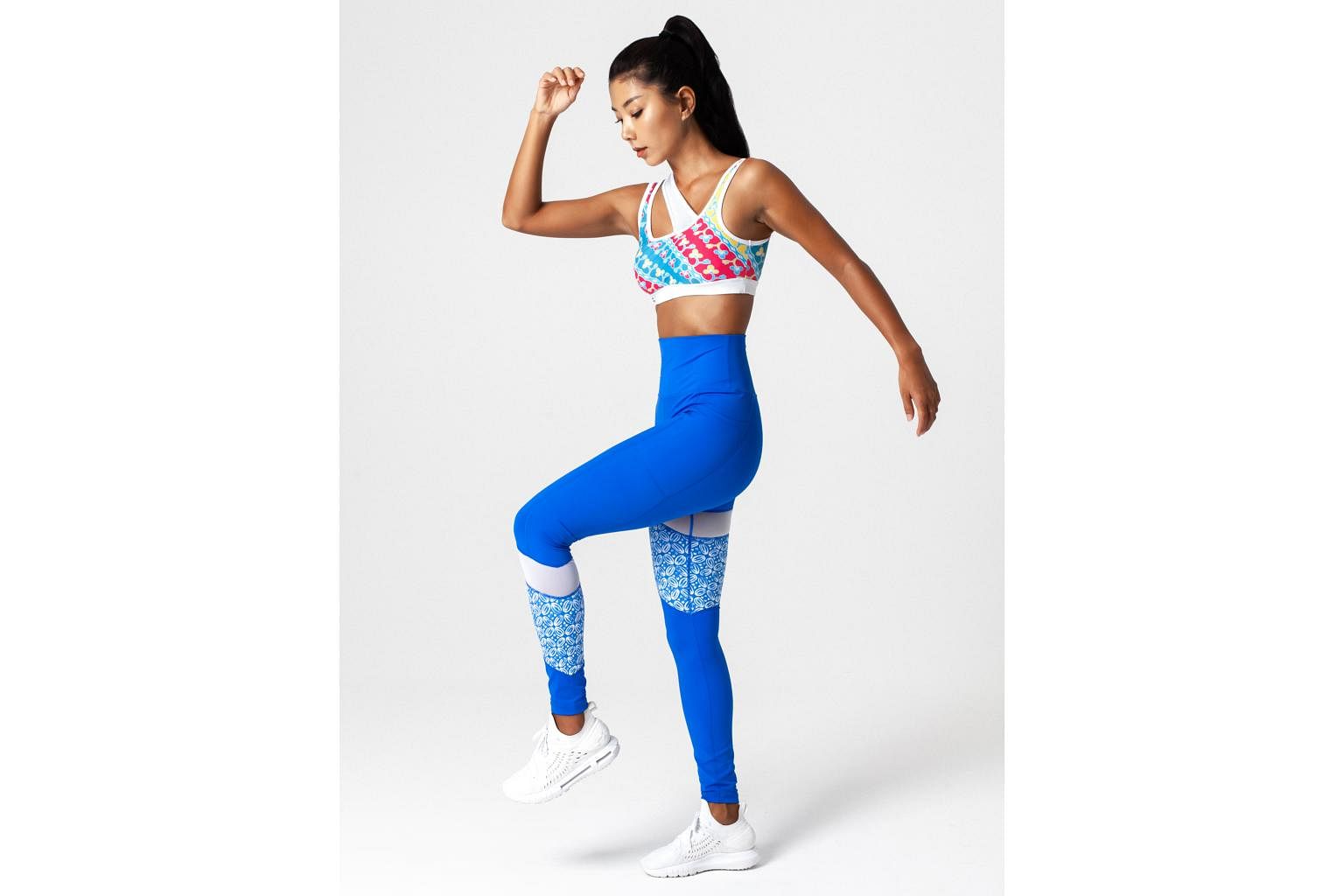
The products Ninja first debuted with remain the same - bra tops ($68), leggings ($88) and shorts ($58). Unlike the main line, which is made from hand-stamped batik, Ninja's patterns are digitally printed as "batik dyes cannot seep into lycra", explains Ms Yeo. "But the motifs that we print on are traditional batik patterns that carry significant meanings."
Since relaunching at end-April, products have been moving faster at a 60 per cent growth rate, she adds. The company started stocking Ninja on Zalora, and have sold about 20 pieces a month.
Customers have given feedback that they "didn't know batik activewear could look luxe, fun and summery", while others have requested men's options such as shorts with batik inner lining.
It is a slow but encouraging start for the YeoMama team, says Ms Yeo, recalling her fears about Ninja in the beginning, when response was poor.
She believes it still has a long way to go in building a relationship with the local fitness community, and creating "motivational content" to sustain the brand.
"In Singapore, fitness people want basic, unflashy gym wear - but that's not what we are about. Getting this group to like our brand is a challenge," she says.
"But my mum has been supportive - she said there's nothing to lose. The worst case scenario is it just doesn't sell."

